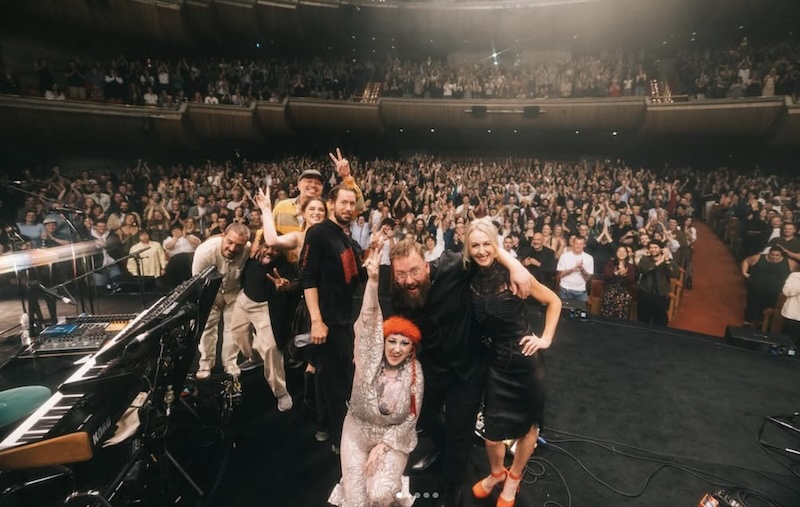AI is screaming down the streaming pipe for local musicians, but industry titans such as Spotify are not fixing it. Michael Sainsbury reports.
When Grammy-nominated Australian musician Paul Bender was innocently checking Spotify for his side project, The Sweet Enoughs – whose most popular track has had more than 6 million streams – he noticed something strange: a track he didn’t recognise had appeared on his artist page.
Bender is a member of Australian jazz funk band Hiatus Kaiyote which has been nominated for three Grammy awards, in three different categories, over three different years. As well as being sampled by Drake, Kendrick Lamar and Beyonce.
“It was something I had never seen, recorded, or certainly uploaded to Spotify,” Bender said. “After listening, it was clear the track was generative AI.”
Alarmed, Bender and his manager, Si Gould, began knocking down doors at their record label and Spotify itself to find out what was happening. Then, last week, two more tracks appeared; again, neither the work of Bender nor anyone associated with him. Both were clearly the product of AI.
Even more concerning, Bender’s Spotify for Artists app notified him that The Sweet Enoughs had more singles scheduled for release, despite the fact that he was still in the process of recording material for his next album.
“It’s perplexing. It’s really perplexing to me. And because I had these fake songs appear one after the other, I was like, what the f*ck is going on? And then I did a little bit of digging, trying to find where else this has happened, and finding heaps of stories of it occurring. Then I found a YouTube video where a guy walked through how he did it.”
The Youtuber video in question – and we ask that you do not try this at home – boasts he made more than $3,000 on Spotify by using generative AI to create tracks that were uploaded to Spotify.
Spotify refuses to admit problem
After raising the issue on social media, Spotify finally responded, but only admitted to a “mapping” problem – a relatively common issue where songs by artists with the same or similar names are mistakenly posted to the wrong account. However, this explanation did little to address the larger issue at play and is, as Bender says, a ‘’laughable” explanation.
Bender is not the first artist to fall victim to what Troy Barrott, co-founder of creative industries law firm CornerSoul, describes as the old-fashioned crime of “passing off”. The fraudulent tracks posted to his account have different Spotify codes, meaning any revenue generated flows to the fraudster, not to Bender.
While Bender may not be directly deprived of revenue, the negative reaction to the AI-generated tracks could impact his algorithmic standing on Spotify, “potentially depriving him of significant income in an industry where even hundreds of dollars in streaming fees are considered a win”, Gould says.
Perhaps most alarmingly, Spotify lacks a process of checks and balances on who can post what where on its platform; despite claiming that every track is listened to by human ears, they clearly are not.
Bender’s video about the problem, uploaded last Friday on Instagram, quickly received global attention, particularly in the US, where the issue received some media coverage late last year.
“Yet another annoying issue in the music industry that will not end despite the fact that it could so easily be fixed, and it should very much be fixed,” respected music industry YouTuber Anthony Fantano said in a video on the back of Bender’s post.
Bender and Fantano are right, the problem of any lack of authentication or robust checking by both the digital service providers (DSPs) – the platforms that artists use to upload music to Spotify – or Spotify itself, has an easy technology fix, but one the industry behemoth appears too cheap to install.
This also exposes the alarming disregard Spotify and other digital streaming platforms have for the artists and creators whose work has made these companies billions.
“If you are just a mid-ranking performer who is making their living, Spotify simply does not care. Bear in mind if you need a million monthly listeners to make a living from Spotify, right!?
“Right. I know people who do that, and they get their royalties just about pay for the groceries and allow them to do other things,” Barrott says. “The big performers, but only the biggest, get specialised treatment.”
Yet this fraudulent practice , is just the latest warning sign of the disruption AI is already causing for artists and creators across music, film, photography, and visual arts. As Bender noted, “ the music didn’t sound anything like my stuff but I am sure that is coming soon with AI”.
Barrott says that Spotify completely protects itself because “when you click the little button that says, yes, I’ve read and agreed to those user guidelines, they wipe their hands of responsibility- in many ways. You are generally agreeing that the material that you’re uploading, if you’re uploading it directly, is not infringing another artist’s copyright, and the load of warranties around your use of the platform.
“It gets even stickier where you’ve then got these independent players like Believe that artists need to upload their material onto Spotify, then do the shame thing and absolve themselves. So you would have to find who has loaded up the offending material – and frankly, that could be a bot farm offshore, good luck with that”.
Tip of the AI iceberg for the music industry
This problem is just the tip of the massive AI iceberg for the music and other creative industries, and a clear signal that Australian governments and regulators need to move much more quickly to establish stronger guardrails to protect creators in the digital age.
The Australian Performing and Recording Association ( APRA). and Australasian Mechanical Copyright Owners Society (AMCOS) sounded the alarm last year in a landmark report, the largest of its kind in the region, that found that by 2028, 23% of music creators’ revenues – over AUD$519 million – will be at risk due to generative AI.
It also found that 82% of creators are worried that AI could make it impossible to earn a living from music.
The government’s 2023 cultural policy Revive report into the music sector found that 67% of music in Australia was consumed through online streaming services in 2021, a number that has surely increased.
With senior Cabinet Minister and avowed music fan Tony Burke retaining the Arts portfolio, Barrott believes the sector is as well placed as it can be to have the Albanese government’s ear.
Music Australia “no comment”
But is Spotify too big to poke? The government’s newish umbrella music organisation said, “This isn’t something Music Australia can comment on”, referring MWM back to APRA. The Australian Recording Industry Association chief Annabelle Herd did not reply to a request for comment.
Editors update May 27: Herd has since replied, saying, “Issues relating to AI and music are impacting artists and recordings in multiple ways. ARIA is working closely on all of these issues with the global industry body IFPI (International Federation of the Phonographic Industry), to ensure a globally consistent approach.”
“From the industry’s point of view, it was good that Labor was re-elected. Unfortunately, legislation and regulators move slowly, and the horse has already bolted,” he said, adding that critically, the Copyright Act needed to “catch up with AI.”
Spoify has taken the fake songs off The Sweet Enoughs feed but they remain on the site under new artist name still called The Sweet Enoughs. Bender says its more trouble that its worth to get them taken down from less popular streaming sites like iTunes, Tidal and Prime.
For the “passing off” problem that Bender – and doubtless countless others have encountered, the fix is far less complicated. “Shut the door, Spotify,” Bender says. “If you have a million mosquitoes coming into your house, you don’t leave the door open and try and kill them one by one. Just shut the door.”
For the bigger AI problem that is coming screaming down the streaming pipe for the music – and other creative sectors – the fix is far less easy.
Australian music loses out in shift to streaming, ticketing oligopoly, struggling venues
Michael Sainsbury is a former China correspondent who has lived and worked across North, Southeast and South Asia for 11 years. Now based in regional Australia, he has more than 25 years’ experience writing about business, politics and human rights in Australia and the Indo-Pacific. He has worked for News Corp, Fairfax, Nikkei and a range of independent media outlets and has won multiple awards in Australia and Asia for his reporting. He is a fierce believer in the importance of independent media.

